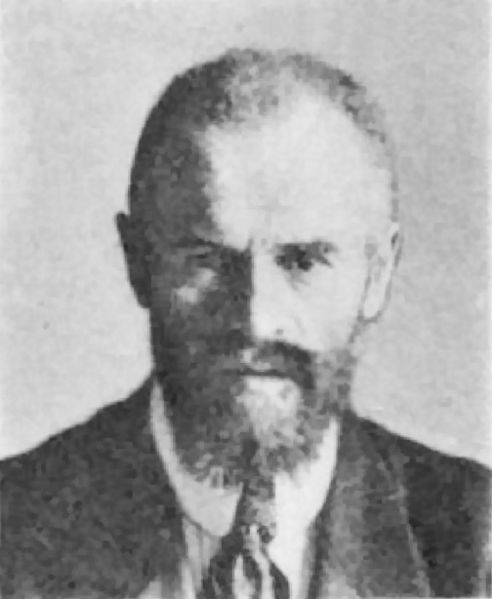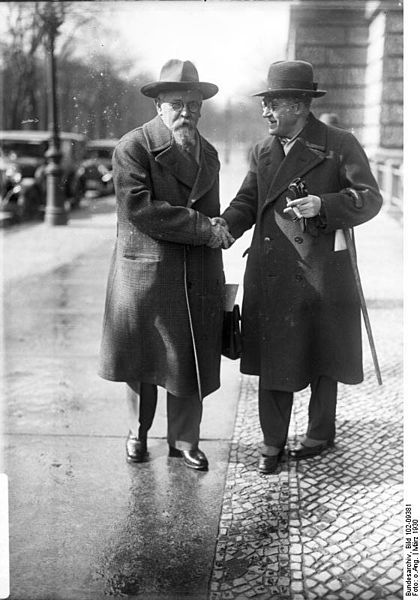<Back to Index>
- Justice Minister Otto Landsberg, 1869
- Economics Minister Rudolf Wissell, 1869
PAGE SPONSOR

Otto Landsberg (4 December 1869 - 9 December 1957) was a German jurist, politician and diplomat. He was a member of the revolutionary Council of the People's Deputies that took power during the German Revolution of 1918 - 19 and then served as Minister of Justice in the first democratically elected government of Germany in 1919. In that capacity, he also was a member of the German delegation that went to Versailles to receive the Allies' Treaty of Versailles.
Landsberg was born on 4 December 1869 in Rybnick in the Province of Silesia, to a Jewish family. His father was a medical doctor. After passing the Abitur in 1887 in Ostrowo, he moved to Berlin to study law. In 1895, having passed the First (1890) and Second State Examination (1895), he opened a lawyer's office in Magdeburg and made a name for himself as a trial lawyer.
Having joined the SPD in 1890, Landsberg was a member of the Magdeburg city council from 1903 to 1909. After failing to get elected for Schwarzburg - Sondershausen in 1907, in 1912, Landsberg succeeded in becoming the Reichstag delegate for Magdeburg. Since there were no elections during World War I, he held the seat until 1918.
In May 1912, as a freshman, he refused to leave the chamber with the rest of the SPD for the Kaiserhoch (a cheer for the Emperor) but stood up for it, ignoring party tradition. Landsberg's numerous Reichstag speeches subsequently showed him to be an excellent speaker. During World War I, he supported the policies of the majority of the SPD parliamentary group, opposing Karl Liebknecht and Hugo Haase. After they had left the party fraction in 1916, Landsberg became even more prominent since he was one of only a few jurists remaining. Of a nationalistic bent, he approved of the war loans and argued in favor of the territorial integrity of the Reich, including Alsace - Lorraine, but he opposed German annexation of additional territory. He repeatedly demanded domestic reforms, including "democratization" and changes to the election laws of Prussia and the Reich.
On 23 October 1918, Landsberg became a member of the Fraktionsvorstand (leadership of the SPD Reichstag parliamentary group) and became a delegate to the Interfraktioneller Ausschuß where he argued for proportional representation, female suffrage and the democratisation of the Prussian bureaucracy.
From 10 November 1918 to 13 February 1919, he was one of three (later five) SPD members of the Council of the People's Deputies, being responsible for the press, arts and literature. Together with Friedrich Ebert Landsberg fought for parliamentary democracy and a national assembly, opposing a Soviet system and left wing uprisings. He strongly supported Upper Silesia remaining a part of the Reich.
On 19 January 1919, Landsberg was elected to the Weimar National Assembly for Magdeburg and Anhalt. On 11 February, Landsberg succeeded Paul von Krause as Secretary of State of the Reichsjustizamt and on 13 February became Minister of Justice in the government of Philipp Scheidemann.
Landsberg was a member of the German delegation that went to Versailles to receive the Allies' demands in the form of the Treaty of Versailles. He opposed signing the Treaty and resigned over the issue, with the other ministers of the cabinet, on 20 June 1919. He refused to participate in the vote on the Treaty in the National Assembly.
His abilities and experience made Landsberg become first Geschäftsträger (Chargé d'affaires) and then Gesandter (ambassador) of Germany in Belgium. However, he was not very successful in that role, which effectively ended in early 1923, when the Occupation of the Ruhr by French and Belgian troops caused his recall to Berlin. In 1924, he again began practicing law there. He was counsel for his friend Friedrich Ebert in the Reichspräsidentenprozeß (defamation suit brought by president Ebert) at Magdeburg and in the so-called Dolchstoßprozeß (see Dolchstoßlegende) at Munich of 1925 he was a witness rebutting the charges against the Social Democrats.
He was a member of the Reichstag from 1924 to 1933. In that role, he opposed an amnesty for those convicted of Feme murders, expressed regret about the state of political discourse and criticized the bias that made many judges treat right-wing defendants more leniently than left wing ones.
In 1933, Landsberg emigrated first to Czechoslovakia and Belgium, later to the Netherlands. Friends concealed him during the Nazi occupation of that country. He remained in the Netherlands after the end of the Nazi regime in 1945 and died on 9 December 1957 in Baarn.

Rudolf Wissell (9 March 1869 - 13 December 1962) was a German politician in the Social Democratic Party of Germany (SPD). During the Weimar Republic, he held office as the Minister for Economics and the Minister for Labor.
Wissell was born in Göttingen, Province of Hanover. He was a member of the SPD from 1888, and belonged to the right wing of the party. From 1908, Wissell was a member of the central workers' secretariat of trade unions in Berlin. From 1916 he worked part time in the SPD newspaper Vorwärts.
In March 1918, Wissel was elected to the Reichstag for the electoral district "Potsdam 6"; he remained a member of the Reichstag until the collapse of the monarchy in November of that year. On 28 December 1918 Wissell was called to join the Council of the People's Deputies, along with Gustav Noske. The appointments came about after the three representatives of the Independent Social Democratic Party of Germany (USPD) had withdrawn from the Council. This opened an opportunity for the SPD to send more delegates to the Council. During the revolution, as Second Chairman of the General Commission of Trade Unions, Wissell also called for an arrangement with employers, and opposed the formation of a Soviet republic. One result of his arguments was the conclusion of the Stinnes - Legien Agreement, which meant that the employer's associations for the first time recognized the trade unions as the representatives of the workers.
In January 1919, Wissel was elected as an SPD candidate to the Weimar National Assembly. One and a half years later, in June 1920, he was elected to the first Reichstag of the Weimar Republic. He was re-elected 7 times from 1924 to 1933, and was a member of the German parliament for almost exactly 13 years, from June 1920 to June 1933. The important parliamentary activities that Wissell participated in during his time in the Reichstag included the vote on the Enabling Act in March 1933: here, he was one of 94 members who voted against the law that created the legal foundations for the Nazi dictatorship. It was passed by 444 votes to 94.
Apart from his work as a member of the Reichstag, Wissell filled various high public offices in the 1920s. From February to July 1919, he was the first Minister of Economics of the Republic. In this function, he worked towards a socially controlled economy for the benefit of the community. When this plan was not successful, he resigned. From 1928 to 1930, as Minister of Labor he belonged to the Kabinett der Persönlichkeiten (Cabinet of Personalities) under Hermann Müller. In 1929, he received an honorary doctorate from the University of Kiel due to his public service.
As a politician engaged in social policy, Wissell was a member of the executive committee of the German General Trade Union Federation from 1919 to 1924. From 1924 to 1932 he was also an arbitrator in pay negotiations in Berlin and Brandenburg.
After the Nazis' rise to power in early 1933, Wissell was expelled from public life, being a prominent Social Democrat. His Reichstag membership was withdrawn in June 1933. He was also placed under arrest for 2 months. He then lived a withdrawn life in Berlin until 1945.
After 1945, Wissell worked on rebuilding the SPD in Berlin. He clearly rejected a unification of the SPD and the Communist Party of Germany (KPD). In the last years of his life, he received many different honors: in 1949 he became an honorary citizen of Berlin and in 1954 received the Großes Bundesverdienstkreuz (Great Cross of Merit). When he died in West Berlin in 1962, he was buried in a grave of honor of the Berlin Senate in the graveyard of the Protestant church Zum Heiligen Kreuz in the Berlin district of Tempelhof - Schöneberg.
Today, his name is carried by the Rudolf - Wissell - Brücke between Charlottenburg und Charlottenburg - Nord, at 960 meters the longest road bridge of Berlin, as well as the Rudolf - Wissell - Siedlung (Rudolf Wissell Settlement) in Staaken, built in the 1970s, and the Rudolf - Wissell - Grundschule (Rudolf Wissell Primary School) in Gesundbrunnen.